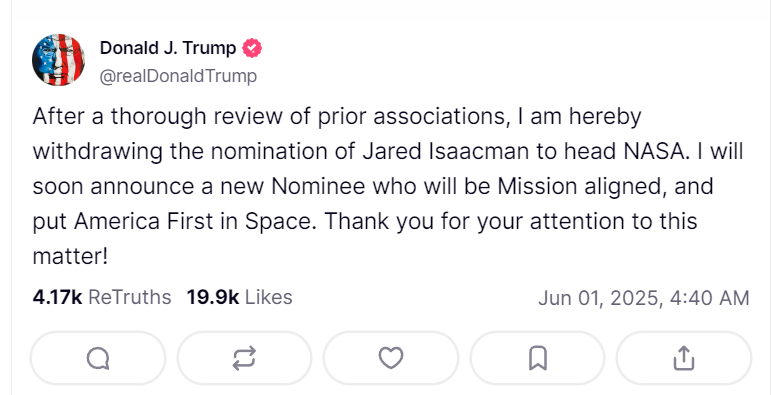The Trump administration’s sudden decision to withdraw Jared Isaacman’s nomination as NASA administrator has sent shockwaves through the space industry, particularly given the timing and apparent strength of his candidacy just days before expected Senate confirmation.
The Official Explanation: “Prior Associations”
President Trump’s own social media statement on June 1st provided the clearest official rationale: “After a thorough review of prior associations, I am hereby withdrawing the nomination of Jared Isaacman to head NASA.” The White House elaborated through spokesperson Liz Huston, emphasizing the need for someone “in complete alignment with President Trump’s America First agenda.”

However, this explanation raises questions about the administration’s vetting process, as the “prior associations” referenced were not new revelations.
The Democratic Donations Factor
According to reporting by The New York Times, the withdrawal was triggered by President Trump learning that Isaacman had made donations to Democratic candidates and party organizations in recent years. This revelation apparently prompted the administration’s reassessment of his suitability for the role.
Crucially, these donations were publicly known information that had been widely reported since shortly after Isaacman’s nomination was first announced. This suggests either a gap in the initial vetting process or a change in how the administration weighted this information against other factors.
The Musk Connection Theory
Industry sources point to another potential factor: the deteriorating relationship between President Trump and Elon Musk, SpaceX’s chief executive who had served as a close presidential adviser. Isaacman was widely perceived as “Musk’s choice” for NASA administrator, given his history as a SpaceX customer through the Inspiration4 and Polaris Dawn private astronaut missions.
The timing of the withdrawal is particularly telling—it came just one day after Trump and Musk held a press conference marking the end of Musk’s formal role as a special government employee supporting the Department of Government Efficiency. While the nomination wasn’t discussed publicly during that briefing, the proximity of events has fueled speculation about connected motivations.
Budget Timing and Policy Alignment
The withdrawal also coincided with NASA releasing detailed information about its proposed fiscal year 2026 budget, which calls for approximately 25% cuts to the agency’s overall spending, with some science programs facing reductions of nearly 50%.
In his Senate confirmation responses from April, Isaacman had expressed reservations about such steep cuts, stating that slashing science funding by nearly half “does not appear to be an optimal outcome.” This position may have put him at odds with the administration’s cost-cutting priorities, potentially contributing to concerns about his alignment with Trump’s agenda.
Industry Shock and Political Support
The decision caught the space industry completely off-guard. Isaacman appeared to have all the necessary support for confirmation—Senate Majority Leader John Thune had already filed cloture on May 22, setting up what seemed like a certain confirmation vote for the week of June 3.
His backing was remarkably broad: 28 former NASA astronauts endorsed him in March, former NASA administrator Jim Bridenstine called him an “amazing” choice, and he received favorable votes from both Republicans and Democrats on the Senate Commerce Committee. Multiple industry organizations had actively lobbied for his confirmation.
Senator Tim Sheehy (R-Mont.) expressed particular dismay, posting on social media that Isaacman “was a strong choice by President Trump to lead NASA” and that he “strongly oppose[d] efforts to derail his nomination.”
What This Means for NASA
The withdrawal leaves NASA in an uncertain position at a critical juncture. The agency is already grappling with proposed massive budget cuts that would fundamentally reshape its priorities and capabilities. Without confirmed leadership, implementing these changes—or advocating for alternatives—becomes significantly more challenging.
The administration now faces the task of finding a replacement who can satisfy both Trump’s “America First” requirements and the complex technical and political demands of leading the nation’s space agency during a period of significant transformation.
Isaacman’s Response
In his own statement following the withdrawal, Isaacman thanked Trump for the decision and expressing continued optimism about America’s space future. Notably, he didn’t directly address the reasons for the withdrawal, focusing instead on his gratitude for the opportunity and confidence that “humanity’s greatest spacefaring days lie ahead.”
The Isaacman withdrawal illustrates the complex interplay of political loyalty, industry relationships, and policy alignment that shapes high-level government appointments, even in traditionally apolitical technical fields like space exploration. Anyway, we may never know the actual reasons behind the President’s decision, unless he comments about his decision maybe in the future.